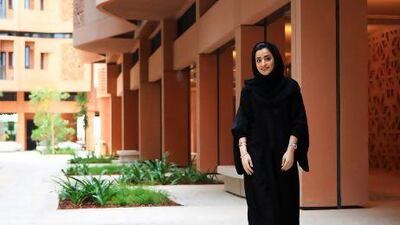Almost half of residents - men and women - questioned in a new study say they do not care about whether their boss is male or female.
The survey of 760 people compiled for Al Aan TV's Nabd Al Arab ("Arab's Pulse") and The National by YouGov found 46 per cent of respondents have no preference as to their boss's gender.
"It's quite remarkable that such a large portion of people don't have a preference," says Amanda Nimon Peters, dean of Hult International Business School Dubai.
"That means there's great opportunity to shape or change people's perceptions."
The traditional view of the leader as a man is quickly changing, academics say.
Dr Paul Williams, associate dean of the School of Business and Management at American University of Sharjah (AUS), says the country's strong diversity of cultures, access to education and industry responsiveness have had a great deal to do with that change.
"These biases once existed in other countries but through strong professional initiatives they changed," Dr Williams says.
"While the same drastic measures are required here, these values are embedded in the community because of the diversity."
Of the other respondents, 45 per cent say they would prefer a male boss, while 9 per cent would rather work for a woman.
The lack of women in leading positions plays an important role in the findings, experts say.
Last year's Grant Thornton International Business Report shows women hold about 20 per cent of senior management positions globally.
But in the UAE, they only hold 9 per cent.
"Psychology shows that people find it difficult to accurately evaluate a situation which they haven't experienced," Dr Peters says.
"The number of women holding senior positions here is far below the global average. That limits people's experiences and this will bias their judgment."
Dana Shadid, project manager and producer of Nabd Al Arab, says this skewed workplace environment can influence behaviour.
"Women can be more competitive to ensure that results meet expectations, or are even better than their male peers," Ms Shadid says.
"However, this perfectionism is also a positive example of how she runs her household, making sure that everything is in place."
Gender perceptions come to the fore when respondents are asked with what skills each gender performs best.
Only 14 per cent of respondents say women make better leaders, yet more say women are better at communication and listening than men.
"This is the perception of gender rather than the reality," says Dr Linzi Kemp, assistant professor of management and public administration at AUS. "When people work with men or women, they realise that these traits are individualised."
Other biases are revealed when respondents are asked which careers were most suited for each gender.
Women score lowest when it comes to transport, distribution and logistics, at 6 per cent, followed by engineering at 16 per cent.
But this is not stopping young women pursuing their interests.
At the UAE University, about 800 of the 1,300 engineering students are women.
While this can be partly attributed to the fact that men make up only a quarter of the university's students, it is still a significant achievement, says Dr Reyadh Almehaideb, dean of engineering.
"Historically, engineering was seen as a tough profession only suitable for men, but that has changed," Dr Almehaideb says.
"The standards have improved and field work conditions have improved. For example, employers are now offering day trips so that women don't have to stay overnight."
But Iman Ustadi, an Emirati AUS graduate of chemical engineering, says she wants to see more support from employers.
"There's still a minor gap when companies are choosing between hiring men or women," Ms Ustadi says. "I can understand their concerns but they should give us the opportunity to prove ourselves first, then make the decision.
"I didn't choose engineering to stay in the office, I chose it because I want to go to the field and see what I studied come to life."
Ms Ustadi is now doing her master's at the Masdar Institute of Science and Technology, and says she still gets comments from relatives about her career path.
"It may take time but once they see that you're successful, they will support you," she says.
"As a local student, I want to be part of the future of the oil and gas industry in the UAE.
"Women make up half the talent pool. If you go to a place that's only led by men, where's the innovation? Where's the growth?"
mismail@thenational.ae

Nearly half of UAE residents have no preference on boss's gender
Academic says change in views on women in workforce partly due to UAE's cultural diversity, access to education and industry response.
Most popular today
8
